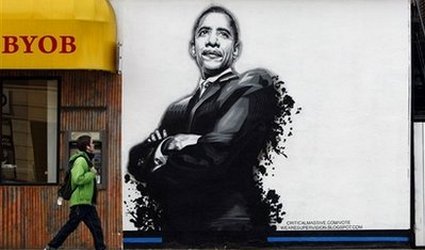Edited by Heidi Kaufmann

By declaring the similarity between the oil spill disaster in the Gulf of Mexico and 9/11, President Barack Obama has elevated the drama and placed the bar for efficiency very high in the minds of Americans. He set his ambitions at a “too-big-to-fail” level, which raises questions regarding his second term and forces him to hasten cleaning up the Gulf, but not only that … Washington too, perhaps?
Already two months have passed since the disaster; the oil spill has become a familiar and hated scenario for Americans. Frank Rich, the vocal New York Times columnist, says so. The comparison with 9/11 is appropriate. The problem is that the speech from the Oval Office the following Tuesday reversed its importance by making vagueness and imprecise timing the pillars of discourse. It was about “a clean energy future,” “a long-term Gulf Coast restoration plan” and the inevitable “national commission,” suggestive of Washington’s administrative side — and causing a great deal of disappointment among the good people who want the Gulf cleaned up now.
Yet, the entire credibility of Obama’s presidency in this affair rests on his assertion that, within a few weeks, more than 90 percent of the fuel will be recovered, and that the $20 billion fund demanded from BP — and to be placed under the control of Kenneth Feinberg — will indeed become a reality. America is on its guard: So far, the big campaign promises (lower unemployment rate and peace in Afghanistan) have been put on hold, and the health care reform — a true Obama success — will not become a reality in the life of Americans for a few years yet.
This oil spill disaster could not have come at a worse time. What means does Obama have to stop the leak? Not a lot more than he has to create new jobs or bring Karzai under control. And when, at the end of his Oval Office intervention, he placed America in the hands of God, he was in fact begging for a miracle. However, what America wanted to know was what actions he would take regarding his more than culpable administration. This is the idea developed by Rolling Stone (though remaining very close to Obama’s convictions) in a paper confounding the responsibility in the White House.
It is the administration (Interior Department Secretary Ken Salazar and the Minerals Management Service) that is slowing him down and that, for years, has been giving BP unlimited leeway, even after such significant problems as 1989’s Exxon Valdez disaster. And so the public opinion wonders: First, would Obama have been as definite as he was on the subject of offshore drilling had he been aware of the connivance between the administration and the oil companies? Second, before saying he would like to see Tony Hayward fired from BP, he could have attributed responsibility to his own administration. And third, not once since the oil spill started have we heard him voice any doubts about the continuation of offshore drilling.
Obama needs to clean up his own quarters. It is a clarification of their president’s position that the Americans need. They need to see his capacity to do the cleaning in his own house before another crisis arises, which would be unavoidable in the short term and would have to be anticipated if the president is to avoid accusations of political naivete.
On the political front, this oil spill may turn out to be a great opportunity for Obama to destabilize the Republicans and cause chaos among their ranks, by “helping” them clean up. The GOP has been, for months, the toy of the populist right of the tea party movement, which is anti-government, anti-Washington and anti-big anything. It is time for Obama to explain to America that those “crusaders” are mere flunkies for giants like BP who control everything and everyone and hardly give a damn about those little tea partiers and their short-lived festivals. He should also remind them that 71 percent of the oil companies’ electoral donations go to the Republican Party. The Republican Party saw this danger coming so clearly that it stopped in their tracks some of its members who were describing the $20 billion as racketeering by Obama, in order to permit Michele Bachmann’s soppy discourse about redistribution to the victims (i.e. the little people). End of the announcement.
During his campaign, Barack Obama had promised to change Washington. It is his ability to show himself as the game master that is at the heart of the debate. And by immediately reaching for BP’s wallet, Obama for once may have bent the rules of the game.

Leave a Reply
You must be logged in to post a comment.